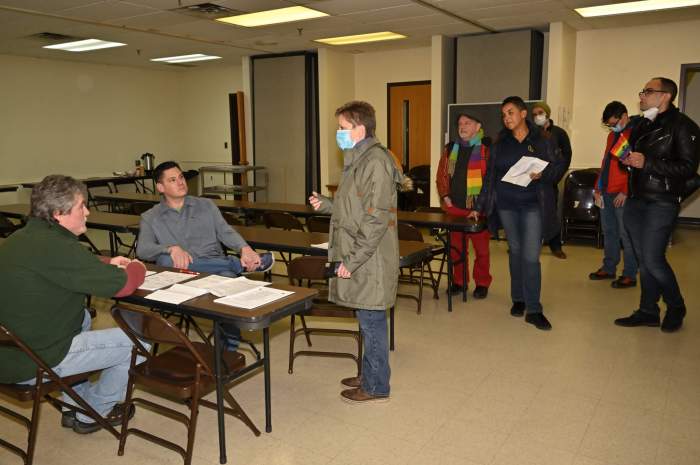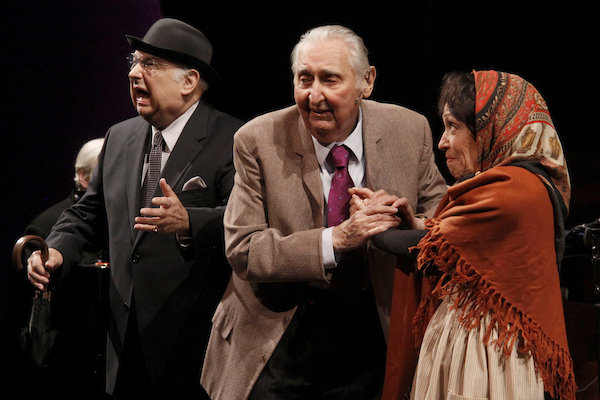
BY TRAV S.D. | Audiences at the Metropolitan Room are about to be treated to a spectacle that is increasingly rare, and destined to become more so. On March 7 and 8, the legendary Fyvush Finkel, 93, will perform a solo show chronicling 84 years in show business — including his beginnings in the Yiddish theater of New York’s Lower East Side, summers as a Catskills entertainer, and 12 years in the national touring company of “Fiddler on the Roof.”
Finkel is best known for his Emmy-winning portrayal of lawyer Douglas Wambaugh on the TV series “Picket Fences” (1992-1996), and for his role as the dybbuk in the Coen Brothers’ 2009 film “A Serious Man.” Finkel, who sings in addition to telling jokes and stories, will be accompanied by his sons Elliott (on piano) and Ian (on xylophone). Stitching it together is the theme of Yiddish vaudeville, of which Finkel may be one of the last true exemplars.
Yiddish is, of course, the lingua franca of the Jewish people of Europe. It began in the Middle Ages as a dialect of German, then spread with the migrations of the Jews into Eastern Europe, and finally, around the turn of the last century, to America.
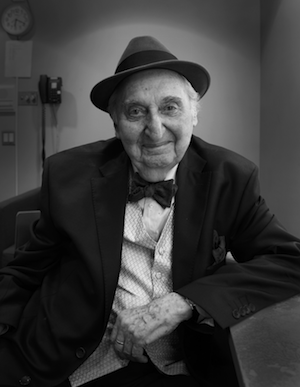
The highest concentration of Yiddish speakers in America was on New York’s Lower East Side. It was inevitable that the Yiddish-speaking theater would transplant itself in New York, as well. From the 1880s through the mid-20th century, peaking in the 1920s, there were dozens of thriving Yiddish venues on the Lower East Side presenting stars like Boris Tomashefsky, and Jacob and Sara Adler (parents of Luther and Stella — the famous acting teacher). For a time, Second Avenue was known as “the Yiddish Rialto.”
“Yiddish was our primary language at home,” says Finkel. “Even the dog, Tootsie, only responded if we talked to it in Yiddish.”
Finkel grew up in the Brownsville section of Brooklyn. His father Harry emigrated from Warsaw and earned his living as a tailor. But the needle and thread were not for Fyvush.
“I was nine years old when I started in the theater,” Finkel remembers. “There was an advertisement in the Jewish newspaper The Forward. This was around 1934. They needed a boy soprano to sing ‘Oh Promise Me’ during a wedding sequence. I was hidden in a box seat and I stopped the show cold. I got a dollar a week. So I became a child star in the Yiddish theater. And I trained for that. I was taught to speak ‘fine Yiddish’ or ‘stage Yiddish,’ which was different from how we spoke at home. Just as they used to have more formal English on stage than people ordinarily spoke. Today, people can talk however they want!”
Amazingly (since it’s considered a dead language), Finkel performed in the Yiddish theater for 35 years.
“My first show as an adult was ‘Who is Guilty.’ I was in my 20s and I knocked the hell out of that thing. The crowd loved me, and the show was a big hit. There was no TV in those days and no advance ticket sales with a credit card. The box office had lines around the block. It was at the Hopkinson Theatre, and I got to appear with great Yiddish stars like [the husband and wife team] Julius Adler and Henrietta Jacobson.”
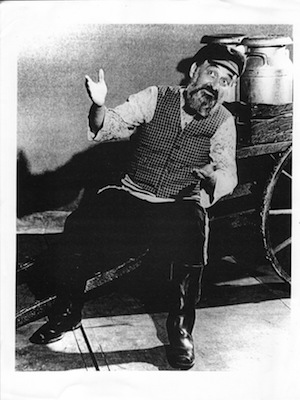
Starting in 1938, as so many did in those days, Finkel began to spend his summer playing Borscht Belt hotels in the Catskills.
“There were 400 of them back then! I played 50 hotels a summer. I played ’em all!” he reminisces. “They had a emcee, a social director and a second comedian, and that was how I got my start. I was a single, a monologist. Nowadays you’d call it stand-up. And I had them laughing, shrieking! Back then it was all about clean family life. The people didn’t even want dirty material. It’s like Milton Berle said: ‘If you pull your pants down once, it’s funny. But then you have to keep doing it, and it isn’t funny anymore.’ ”
True to that philosophy, the Finkels promise a family show at the Metropolitan Room. “It’s probably the world’s funnest and cleanest show,” says his son Ian, who carries on the family tradition with his own xylophone-based vaudeville act.
“Fyvush Finkel is the world’s last living link to the Yiddish vaudeville tradition,” says latter-day Yiddish performer Shane Baker. “He has trained generations of younger actors in the styles and techniques both onstage and off. My favorite memory? Strolling with him down 50th Street, someone stopped him to shake hands or get an autograph every three feet. He took time to warmly greet each and every one, offering as an aside, ‘That’s my public! I work for them!’ — the consummate showbiz professional.”
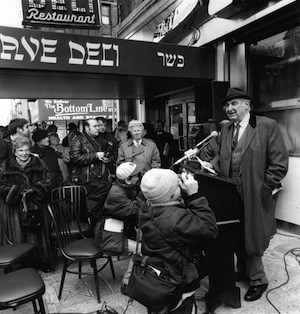
Star on the Yiddish Walk of Fame. Courtesy Fyvush Finkel.
Yiddish scholar and translator Caraid O’Brien agrees: “Fyvush is ‘The Last Confederate Widow’ of the Yiddish stage. When he goes, may it not be soon, our link to an entire generation of Yiddish theater performers is gone forever. He’s also part of a grand, inspiring tradition of Yiddish performers who never retire. He’s funny and charming, and at this point completely unique, a true Yiddish comedian.”
The amazing thing is, when Finkel began to enjoy national success, he’d already been in show business for 60 years.
“The older I get, the busier I’m getting,” he marvels.
And the lively nonagenarian gives no indication of quitting. He recently wrapped the John Susman film “Game Day,” scheduled for release later this year.
Mon., Mar. 7 & Tues., Mar. 8, at 7 p.m. at The Metropolitan Room (34 W. 22nd St., btw. Fifth & Sixth Aves.). For tickets ($35, plus two-drink minimum), call 212-206-0440 or visit metropolitanroom.com.




























